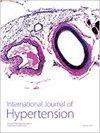AGTR1 A1166C和CYP2C9 * 3基因多态性与缬沙坦降压作用的关系
IF 1.7
4区 医学
Q3 PERIPHERAL VASCULAR DISEASE
引用次数: 3
摘要
血管紧张素II型受体阻滞剂(ARBs)在降压治疗中的差异可能与药物靶向受体和药物代谢相关基因的多态性有关。本研究旨在探讨ARB药物缬沙坦的降压作用是否与血管紧张素II型1受体(AGTR1)基因多态性(A1166 C)和细胞色素P450酶2C9 (CYP2C9)基因多态性(CYP2C9 * 3)有关。方法回顾性分析近一个月内接受缬沙坦单药治疗的281例高血压患者。采用聚合酶链反应-熔化曲线分析AGTR1和CYP2C9基因多态性。根据就诊时收缩压(SBP)和舒张压(DBP)分为良好对照组(n = 144,收缩压/舒张压<140/90 mmHg)和不良对照组(n = 137,收缩压/舒张压≥140/90 mmHg)。结果对照组年龄较大,饮酒史较少,轻中度高血压比例较高,丙氨酸转氨酶水平较低,高密度脂蛋白胆固醇水平较对照组高。对照良好组AGTR1 A1166C C等位基因和AC + CC基因型的频率高于对照不良组(P = 0.005和P = 0.006)。在调整人口统计学和环境因素后,与AA基因型相比,AGTR1 A1166C的CC + AC基因型与缬沙坦治疗后更好的高血压控制显著相关(优势比:2.836,95%可信区间:1.199-6.705,P = 0.018)。在控制良好和控制不良的患者中,CYP2C9 * 3多态性的等位基因或基因型分布无显著差异。结论AGTR1 A1166 C多态性可能与缬沙坦的降压效果有关,AC和CC基因型携带者对缬沙坦的降压效果反应可能更好。本文章由计算机程序翻译,如有差异,请以英文原文为准。
Association of AGTR1 A1166C and CYP2C9∗3 Gene Polymorphisms with the Antihypertensive Effect of Valsartan
Background The differences in the antihypertensive treatment with angiotensin type II receptor blockers (ARBs) may be attributed to polymorphisms in genes involving drug-targeted receptor and drug metabolism. The present study aimed to investigate whether the antihypertensive effect of the ARB drug valsartan was associated with angiotensin II type 1 receptor (AGTR1) gene polymorphism (A1166 C) and cytochrome P450 enzyme 2C9 (CYP2C9) gene polymorphism (CYP2C9∗3). Methods 281 patients with hypertension who received valsartan monotherapy in the past month were included in this retrospective study. Polymerase chain reaction-melting curve analysis was performed to genotype the AGTR1 and CYP2C9 gene polymorphisms. Based on the systolic blood pressure (SBP) and diastolic blood pressure (DBP) at the time of visit, the patients were divided into well-controlled group (n = 144, SBP/DBP <140/90 mmHg) and poorly controlled group (n = 137, SBP/DBP ≥140/90 mmHg). Results Older age, decreased history of drinking, a higher proportion of mild-to-moderate hypertension, lower alanine aminotransferase levels, and higher high-density lipoprotein cholesterol levels were observed in the well-controlled group than the poorly controlled group. Higher frequencies of the C allele and AC + CC genotype of AGTR1 A1166C were detected in the well-controlled than the poorly controlled patients (P = 0.005 and P = 0.006). After adjustment for demographic and environmental factors, the CC + AC genotype of AGTR1 A1166C was markedly linked to better hypertension control with valsartan treatment compared to the AA genotype (odds ratio: 2.836, 95% confidence interval: 1.199–6.705, P = 0.018). No significant difference was observed in the allele or genotype distribution of CYP2C9∗3 polymorphism between well-controlled and poorly controlled patients. Conclusions The current data suggested that the AGTR1 A1166 C polymorphism may be associated with the antihypertensive effect of valsartan, and carriers with AC and CC genotypes may have a better antihypertensive efficacy response to valsartan treatment.
求助全文
通过发布文献求助,成功后即可免费获取论文全文。
去求助
来源期刊

International Journal of Hypertension
Medicine-Internal Medicine
CiteScore
4.00
自引率
5.30%
发文量
45
期刊介绍:
International Journal of Hypertension is a peer-reviewed, Open Access journal that provides a forum for clinicians and basic scientists interested in blood pressure regulation and pathophysiology, as well as treatment and prevention of hypertension. The journal publishes original research articles, review articles, and clinical studies on the etiology and risk factors of hypertension, with a special focus on vascular biology, epidemiology, pediatric hypertension, and hypertensive nephropathy.
 求助内容:
求助内容: 应助结果提醒方式:
应助结果提醒方式:


